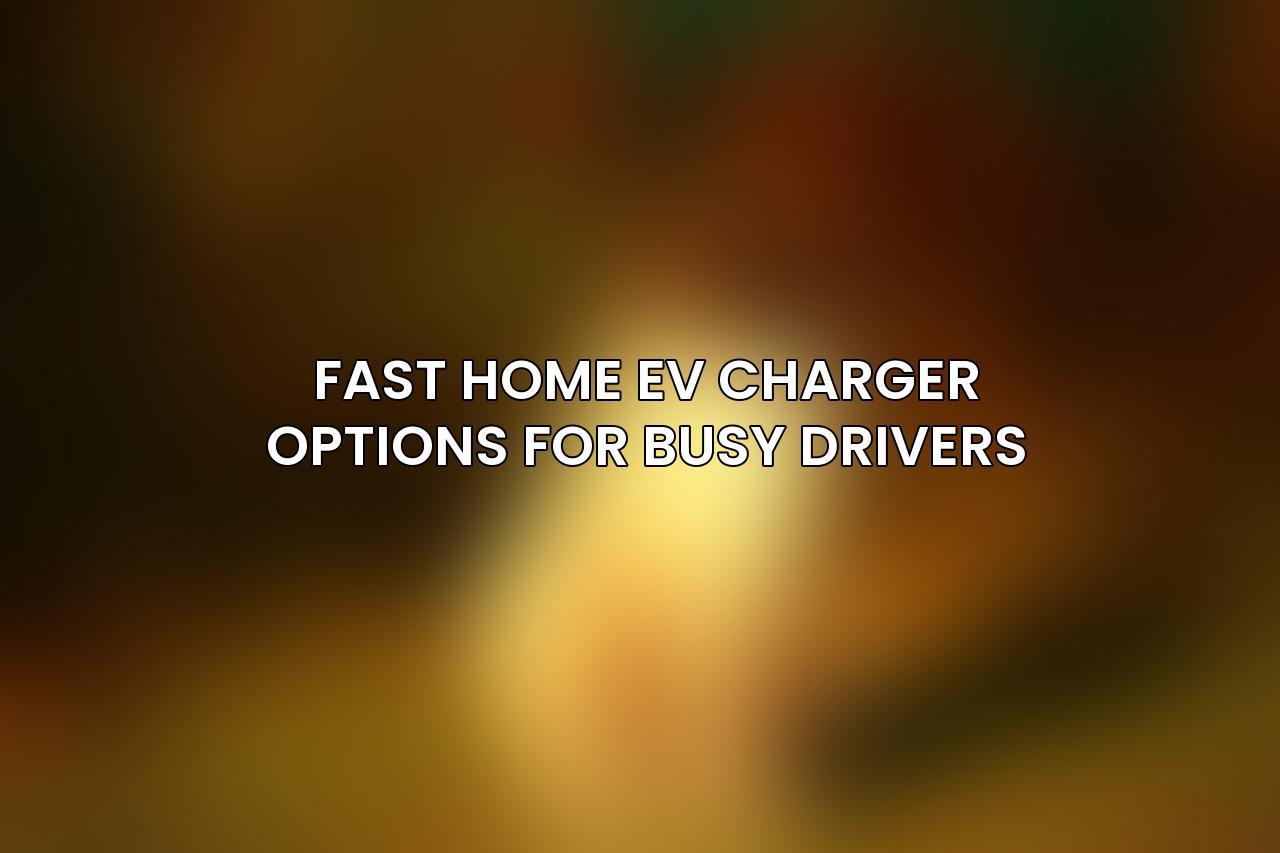The automotive industry has witnessed a significant shift towards electric vehicles (evs), driven by a collective effort to reduce carbon emissions and dependency on fossil fuels. With this transition, the demand for efficient and fast home EV chargers has become crucial, especially for busy drivers who rely on their vehicles for daily commuting and activities. The convenience of charging at home cannot be understated, making it imperative to explore the best fast home EV charger options tailored to meet the needs of busy individuals.
When it comes to home charging, understanding the disparity between Level 1 and Level 2 chargers is fundamental. Level 1 chargers operate on a standard 120-volt household outlet and provide a low charging rate, suitable for overnight charging. Conversely, Level 2 chargers require a 240-volt outlet and offer faster charging speeds, making them ideal for busy drivers who need quick recharging between trips. In the quest for efficient charging solutions, opting for a Level 2 charger is paramount to cater to the fast-paced lifestyles of modern drivers.
| Home EV Chargers | Price | Output | Features | Pros | Cons |
|---|---|---|---|---|---|
| ChargePoint Home Flex | $549 | 40 Amps | Wi-Fi and Bluetooth connectivity, 24-foot cable, UL Listed | Reliable, flexible installation options, easy to use | Can be pricier than other options |
| Tesla Wall Connector | $500 | 48 Amps | Wi-Fi connectivity, 25-foot cable, dedicated to Tesla vehicles | Fast charging speeds, seamless integration with Tesla vehicles | Only compatible with Tesla vehicles |
| Grizzl-E Level 2 EV Charger | $399 | 40 Amps | Wi-Fi and Bluetooth connectivity, 25-foot cable, UL Listed | Affordable, reliable, easy to install | Limited smart features compared to others |
| JuiceBox 40 | $499 | 40 Amps | Wi-Fi and Bluetooth connectivity, 25-foot cable, UL Listed, optional solar integration | Versatile, smart features, solar compatibility | Price can vary depending on features and options |
| Enel X JuiceBox Pro 40 | $599 | 40 Amps | Wi-Fi and Bluetooth connectivity, 25-foot cable, UL Listed, smart features | Powerful, user-friendly interface, remote monitoring | More expensive than basic models |
Quick List :
- 1. ChargePoint Home Flex:
- 2. ClipperCreek HCS-40:
- 3. JuiceBox Pro 40:
- 4. Tesla Wall Connector:
- 5. Fast Home EV Charger Options for Busy Drivers:
Key Factors to Consider
When selecting a fast home EV charger, several essential factors merit consideration to ensure optimal performance and compatibility with your EV model. These factors include the charging speed measured in kilowatts (kW), compatibility with different EV standards, installation requirements, available features like Wi-Fi connectivity and smart scheduling, and the overall budgetary constraints that dictate the selection process.
Top Fast Home EV Chargers
ChargePoint Home Flex
Among the top contenders in the realm of fast home EV chargers is the ChargePoint Home Flex, renowned for its versatility and advanced functionalities. This charger boasts a charging speed of 40 amps and 7.7kW, catering to a wide array of EV models through its compatibility with various charging standards. With features like Wi-Fi and Bluetooth connectivity for remote monitoring, safety mechanisms, and seamless integration with the ChargePoint mobile app, this charger stands out as a reliable and efficient charging solution.
Specs:
| Charging Speed | Compatibility | Features |
|---|---|---|
| 40 amps, 7.7kW | Compatible with J1772, CHAdeMO, and Tesla with adapter | Wi-Fi and Bluetooth connectivity, Built-in safety features, ChargePoint mobile app compatibility |
Advantages:
– Versatile compatibility with most EV models
– Advanced connectivity and control features
You can find more information on Review: Emporia Smart Home EV Charger
– Strong brand reputation
Disadvantages:
– Higher initial cost relative to some competitors
ClipperCreek HCS-40
Another notable option is the ClipperCreek HCS-40, offering a reliable and straightforward charging solution for EV owners. With a charging speed of 40 amps and 7.7kW, this charger is compatible with the J1772 standard and prides itself on durable construction suitable for indoor and outdoor installations. While it may lack some advanced connectivity features, its robust design and affordability make it a practical choice for many drivers.
Specs:
| Charging Speed | Compatibility | Features |
|---|---|---|
| 40 amps, 7.7kW | Compatible with J1772 standard | Durable construction, Optional connectivity, Built-in safety features |
Advantages:
– Reliability and sturdy build quality
– User-friendly design
– Cost-effective option
Disadvantages:
– Limited connectivity compared to other models
– Requires an adapter for Tesla vehicles
JuiceBox Pro 40
For those seeking smart features and sustainable charging options, the JuiceBox Pro 40 presents an enticing choice. With a charging speed of 40 amps and 7.7kW, this charger is compatible with the J1772 standard and integrates Wi-Fi and Bluetooth connectivity, smart scheduling capabilities, and solar integration for eco-conscious charging. While it may come at a higher price point than basic chargers, its advanced features and sustainability focus make it a compelling option for environmentally conscious drivers.
Specs:
Check this blog on Home EV Charger Installation: A Complete Guide
| Charging Speed | Compatibility | Features |
|---|---|---|
| 40 amps, 7.7kW | Compatible with J1772 standard | Wi-Fi and Bluetooth connectivity, Smart scheduling, Solar integration |
Advantages:
– Advanced features and integration possibilities
– Sustainable charging options
– Open API for customization
Disadvantages:
– Higher price compared to entry-level chargers
Tesla Wall Connector
Catering specifically to Tesla owners, the Tesla Wall Connector offers unparalleled charging speeds and seamless integration with Tesla vehicles. With a charging speed of 48 amps and 11.5kW, this sleek charger boasts Wi-Fi connectivity and remote control capabilities through the Tesla app, ensuring a hassle-free charging experience for Tesla enthusiasts. While its compatibility is limited to Tesla vehicles and commands a higher price tag, the convenience and performance it delivers remain unmatched in the EV charging world.
Find more on Top Home EV Charger Reviews 2024
Specs:
| Charging Speed | Compatibility | Features |
|---|---|---|
| 48 amps, 11.5kW | Compatible with Tesla vehicles | Sleek design, Wi-Fi connectivity, Tesla app integration |
Advantages:
– Fastest charging speed for Tesla vehicles
– Seamless integration with the Tesla ecosystem
– Easy installation and management
Explore further with Home EV Charger Incentives 2024 California
Disadvantages:
– Limited to Tesla vehicles
– Higher cost compared to competitors
Choosing the Right Fast Home Charger

Drivers must assess their specific needs and preferences to align with a charging solution that optimally fits their lifestyle and vehicle requirements. conducting a thorough evaluation of charging speeds, compatibility with EV models, available features, and installation considerations is paramount to making an informed decision that ensures seamless charging experiences at home.
Evaluate Your Needs
Understanding the charging demands of your EV, daily driving routines, and budget constraints is crucial in determining the most appropriate fast home charger for your circumstances. By assessing these factors comprehensively, drivers can identify a charger that not only meets their charging needs efficiently but also aligns with their financial considerations for a cost-effective solution.
Compare Features and Prices
To facilitate the decision-making process, a comparative analysis of the key features, charging speeds, and pricing of recommended fast home EV chargers can offer valuable insights into the strengths and limitations of each option. By weighing these factors against personal preferences and requirements, drivers can discern the best-suited charger that balances performance, functionality, and affordability effectively.
Installation Considerations
Engaging a certified electrician to oversee the installation of a fast home EV charger is essential to guarantee safety and compliance with electrical regulations. The complexity of installing a Level 2 charger necessitates professional expertise to ensure proper setup, wiring, and functionality, mitigating any risks associated with incorrect installations.
Government Rebates and Incentives
Exploring available government rebates and incentives for installing a home EV charger can present cost-saving opportunities for drivers looking to offset the initial investment. By leveraging these financial incentives, drivers can reduce the overall expenditure associated with acquiring and setting up a fast home charger, making eco-friendly driving more financially viable and rewarding.
the advent of fast home EV chargers has revolutionized the way drivers power their electric vehicles, offering unparalleled convenience and efficiency for busy individuals on the go. By investing in a reliable and high-performance charger, drivers can enjoy the benefits of reduced charging times, enhanced control through smart features, and long-term cost savings associated with home charging solutions. As the automotive industry continues its electrification journey, embracing fast home EV chargers emerges as a pivotal step towards sustainable and eco-conscious driving practices.
Summary of Benefits
The advantages of owning a fast home EV charger extend beyond mere convenience, encompassing time-saving benefits, reduced reliance on public charging stations, and lowered operational costs attributed to efficient home charging capabilities. By embracing this technology, drivers can seamlessly integrate EV ownership into their daily routines, fostering a greener and more sustainable future for transportation.
Tips for Optimal Charging
To maximize the efficiency and effectiveness of home EV charging, drivers are encouraged to adopt best practices such as scheduling charging sessions during off-peak hours to leverage lower electricity rates, ensuring proper ventilation of charging equipment to prevent overheating, and utilizing smart charging features for personalized and energy-efficient charging routines. By implementing these tips, drivers can optimize their home charging experiences and reap the full benefits of owning a fast home EV charger tailored to their needs.
Frequently Asked Questions
Are fast home EV chargers expensive?
Fast home EV chargers can range in price, but there are affordable options available for every budget. Do your research and consider factors such as charging speed, connectivity features, and brand reputation.
What is the typical installation process for a home EV charger?
The installation process for a home EV charger may vary depending on your home’s electrical setup. In general, it involves mounting the charger, connecting it to your electrical panel, and ensuring it meets safety regulations. It’s recommended to hire a professional electrician for installation.
Can I charge my electric vehicle at a normal wall outlet?
While it’s possible to charge an electric vehicle using a standard wall outlet, it will be significantly slower compared to using a dedicated EV charger. Fast home EV chargers offer higher charging speeds, making them more convenient for busy drivers.
Dive deeper into Home EV Charger Tax Credits: What You Need to Know
Do fast home EV chargers work with all electric vehicle models?
Most fast home EV chargers are compatible with a wide range of electric vehicle models. However, it’s essential to check the charger’s specifications and ensure it’s compatible with your specific vehicle before making a purchase.
Can I monitor and control my home EV charger remotely?
Many fast home EV chargers come with smart connectivity features that allow you to monitor and control the charging process remotely. You can track charging status, schedule charging sessions, and receive notifications through a mobile app or online platform.

